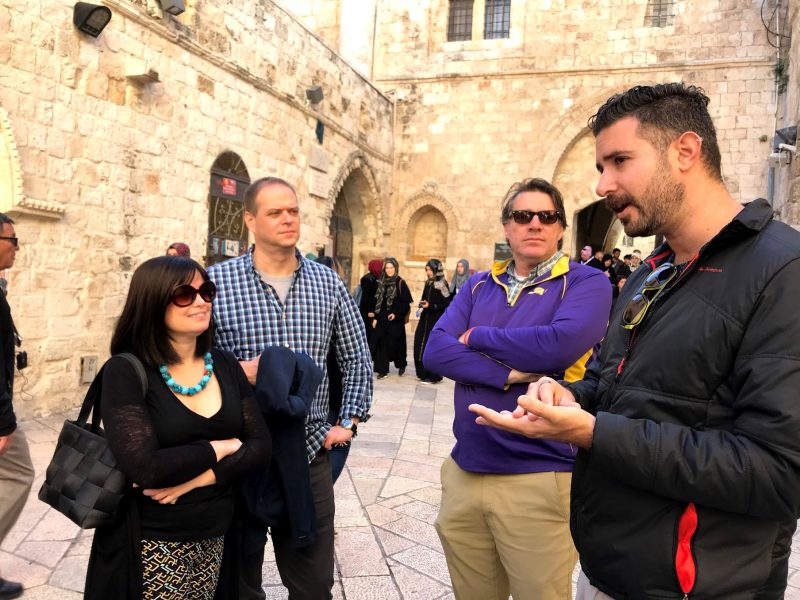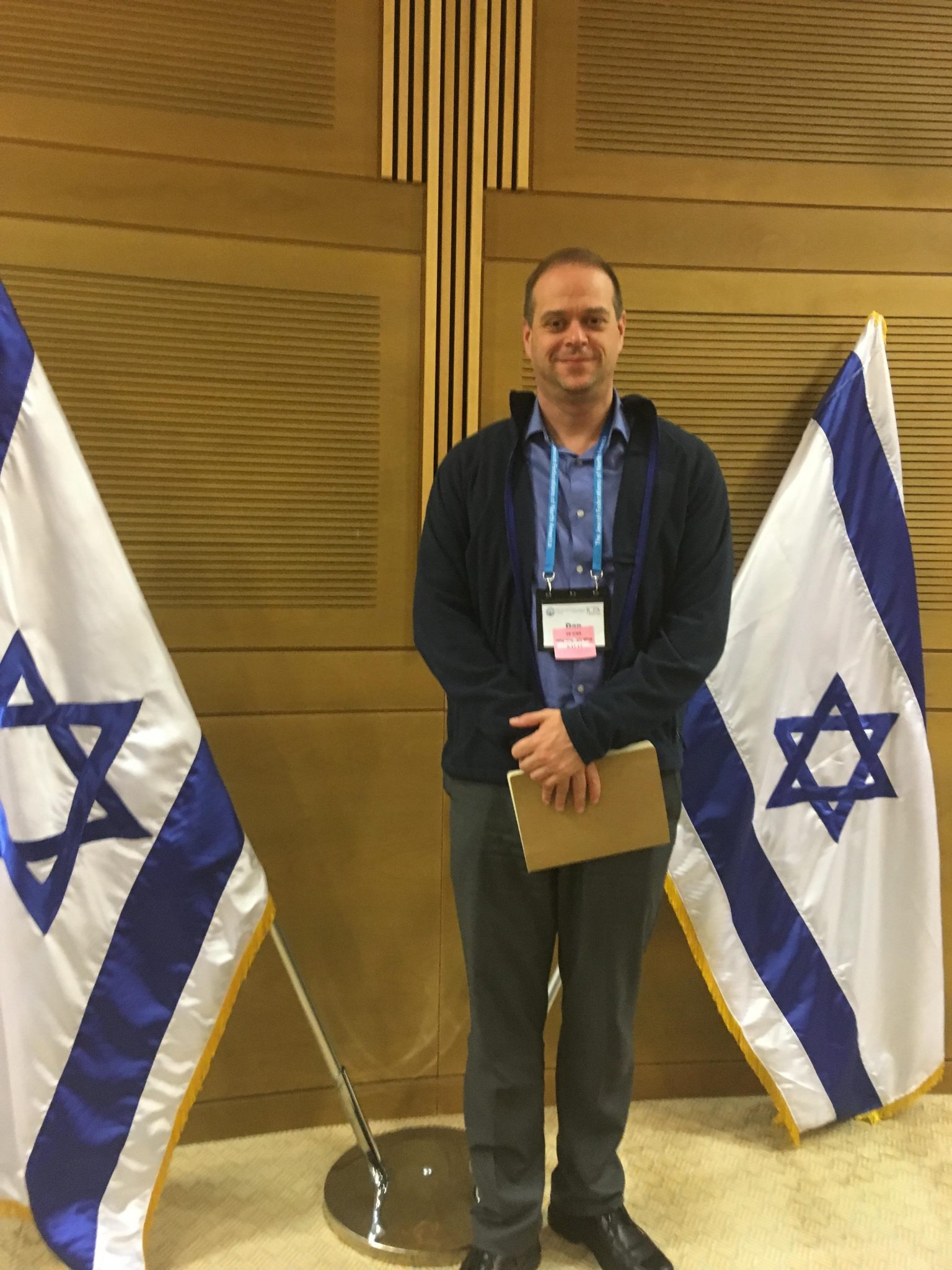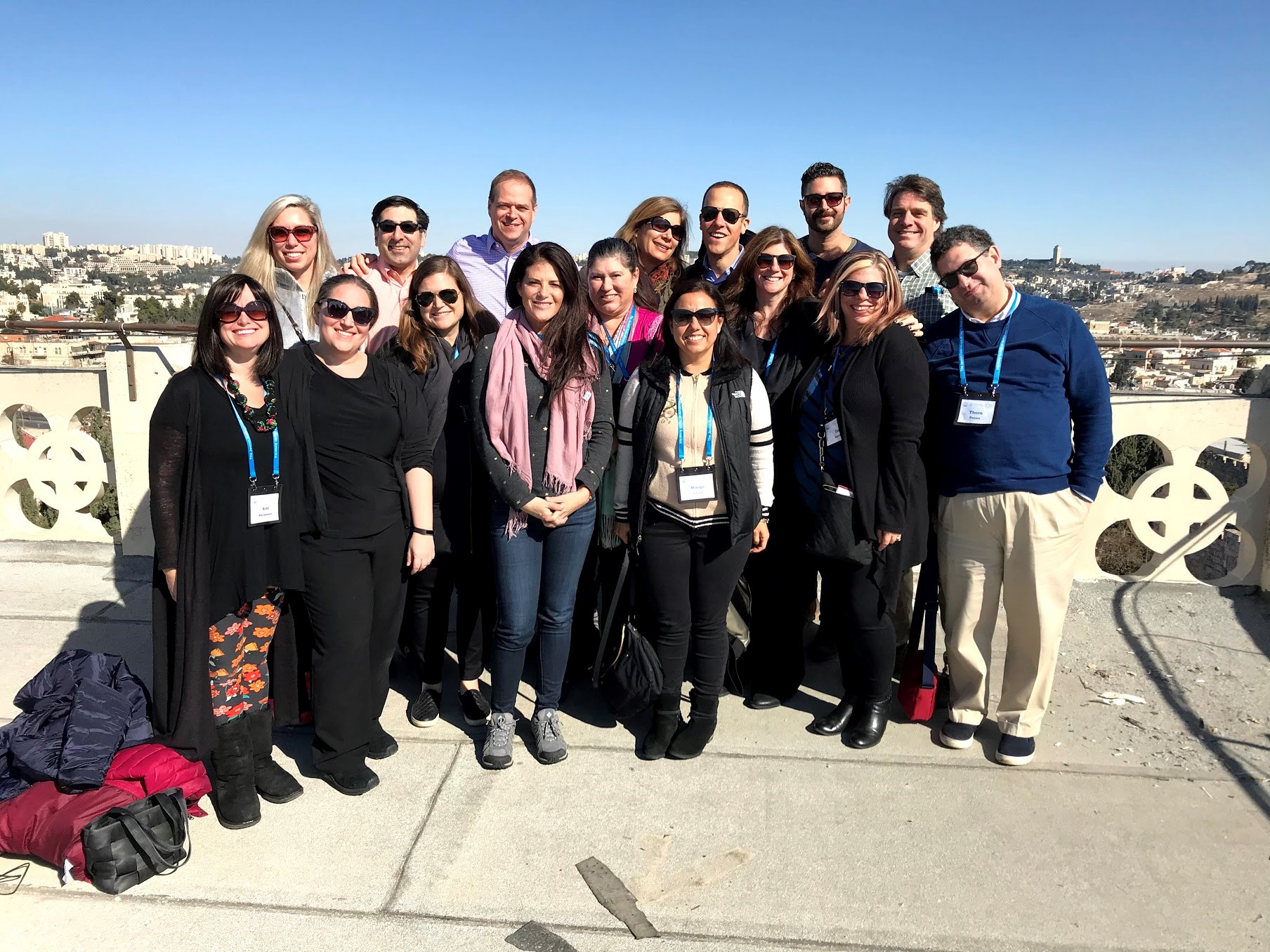Jewish Community Relations Council (JCRC)

Mission to Israel Gives JCRC Board Member Nuanced View of Complex Issues
When given the opportunity to learn more about some of the complex issues surrounding Israel, JCRC Executive Committee member Dan Rapp jumped right in. He is part of a prestigious leadership development program developed by the Jewish Council for Public Affairs (JCPA), which just returned from a mission to Israel. He shares his reflections below. –Jackie
“We, the Jewish community, take great pride in advocating on behalf of Israel,” said Jewish Community Relations Council (JCRC) board member Dan Rapp. “As well we should. Israel is our home, our history, and our safe haven. It’s a cause worth defending with everything we’ve got.
“Israel is also a country filled with different viewpoints, religions, and agendas. So it should be no surprise that Israel wrestles with how to be the democratic home of the Jewish people in a very dangerous neighborhood.”
Rapp recently returned from a mission to Israel with the Jewish Council for Public Affairs (JCPA) Frank Family Leadership Institute for Emerging Leaders.
The 2017 Frank Fellowship Mission gave 13 emerging Jewish leaders, including Rapp, VIP access to thought leaders, social justice activists, military strategists, religious leaders, and elected officials. Their goal was to learn about Israel in a nuanced way so they are better equipped to discuss and advocate for Israel here in the United States.
“This experience reinforced that we can be zealous in our support for Israel without being zealots,” Rapp said. “We can stand up for Israel and not agree with every decision the people or government makes.”
Immigration
One focus of the mission was non-Jewish immigration. Prior to building a security fence along the Egyptian border, Israel experienced an influx of asylum seekers from Eritrea and Sudan, Rapp said. Israel is now debating how to handle these people – to integrate them or deport them.

“Is Israel only for Jews? Or is there also room for non-Jews escaping persecution?” he asked. “And what do Jewish values compel us to do?”
To wrestle with those questions, the fellows met with asylum seekers who faced tribulation and sometimes torture to escape their home countries. They also met with school teachers and principals caring for the children of asylum seekers, as well as staff from governmental social service agencies providing care and guidance.
“Some Israelis see the asylum seekers as infiltrators, while others see them as suffering people who deserve our support,” Rapp said.
Syrian War Victims
Treating Syrians injured in the civil war was another focus.
“Syria has never been a friend of the Jewish state. And yet the Israeli government has decided to offer world-class medical care to Syrians injured in their own civil war,” Rapp said.
The group spoke with doctors, including Dr. Michael Harari, who have treated hundreds of gruesomely injured Syrians.
“We asked the doctors what it was like for them, emotionally,” Rapp said. “Dr. Harari answered that treating massive traumas was difficult, even for doctors who are used to working in the ICU. ‘But it’s more difficult to do nothing,’ he told us.”
Religious Pluralism
On the issue of pluralism, Rapp said the ultra-Orthodox are a vocal minority with more influence than their numbers suggest. They (Haredim) have sway over issues like marriage, conversion, LGBT issues, enforcing Shabbat, and how people can pray at the Western Wall.
“Many of their beliefs fly in the face of our own sense of justice and equality,” Rapp said. “And while the Haredim have influence, the Israeli court system and civil rights advocates are serving as important counter balances.”
Iran Nuclear Deal
The Iran Nuclear Deal was a divisive issue among American Jews at the time it was signed. On the mission, the Frank Fellows met with Eli Waxman, a professor of particle physics and astrophysics who directly advised Netanyahu on the nuclear deal. Waxman told the group the deal is, in fact, preventing Iran from getting a bomb—for now—and that it takes so much space and energy to enrich uranium to weapons-grade potency, that scientists would be able to detect if Iranians were violating the deal, even if inspectors don’t have access to every site.
“He recognized that after ten years, Iran will be free to enrich as much as it wants, so he suggested the international community begin thinking and talking about how to tackle this problem now, before time is up,” Rapp said.
Security
The Frank Fellows spent some time exploring the security wall and talking about a path to peace. Built during the Second Intifada as Israel suffered wave after wave of terrorist attacks, the wall has been effective at stopping terrorists. Dr. Dany Tirza, chief architect of the barrier, told the fellows the barrier prevents about 400 terror attacks every year, and every week, it prevents 20-30 people from illegally crossing into Israel.
Addressing critics, Tirza said what some call an “apartheid wall” is a misnomer, as 20 percent of Israel’s population is Arab, and they have the same rights as Jewish citizens. In addition, he told the group that not one Palestinian was evacuated or moved to build the security barrier. He acknowledged that going through fences and checkpoints can be cumbersome and humiliating for Palestinians, but that Israel takes continual steps to cut down wait times and make the process less intrusive.
“I hope the day will come—I pray for it three times a day—that we will have peace,” Tirza told the Frank Fellows. “And when that day comes, I want to be able to remove the first brick from the wall.”
But much needs to happen before that day arrives.

Prospects for Peace
Mira Eisen, who served as head of Israel’s combat intelligence corps, assistant to the director of military intelligence, and who was appointed as an international advisor to the Israeli Prime Minister, gave her perspective on the main issues interfering with a two-state solution, believing that two states for two peoples is the only way to “solve” the problem long term.
Rapp said the Frank Fellows got insights into those issues, including what Eisen called the “easy” issues: defining borders, Israeli security, Palestinian sovereignty, and settlements. What will be more difficult to solve, Eisen told the Frank Fellows, include the highly emotional issues of Jerusalem and Palestinian’s claim for a “right of return.”
“Jerusalem is Zion, and you can’t take Zion out of Zionism,” Rapp said. “At the same time, Muslims refer to Jerusalem as Al Quds, which means ‘the holy.’ How do you compromise on something you consider holy?”
They heard from Walid Issa, a Muslim who wants peace with Israel.
“Instead of advocating BDS, we should emphasize moderate Palestinian voices,” said Issa, who admits there are lots of Palestinians trying to silence him.
When talking about the Palestinian desire for a right of return, Issa said Israel must recognize history, but Palestinians need to recognize the present. “Israel should acknowledge the right, Palestinians should compromise on the return.”
“I wish there were more Walids,” Rapp said. “Moderates do not grab headlines the way extremists do, but I wish his voice would ring loud and far. It’s a longshot, but I dream of people like Walid leading the future.”
The Frank Fellows will attend JCPA2018, the annual conference for Jewish community relations leaders, in New York City this April. In addition, they are participating in educational trainings on issues of importance to the Jewish communities throughout the year.
Follow the JCRC on Facebook and Twitter.
The Jewish Community Relations Council is one of more than fifty programs and agencies funded by the Jewish Federation of Cincinnati.
The Jewish Federation of Cincinnati: We look at the whole picture, taking into account the diverse needs of the entire community. Together we can do almost anything.
Thanks to you, the JCRC is protecting Jewish security, recognizing that Jewish security depends on a just society for all.

